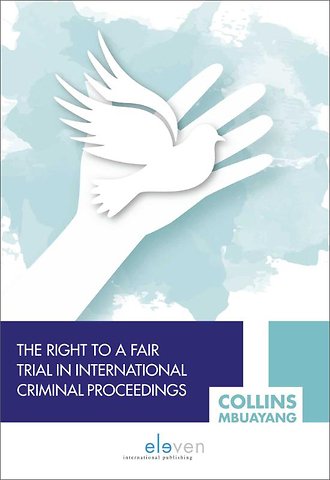



Mbuayang Collins is a former Legal Intern at the United Nations International Criminal Tribunal for the Former Yugoslavia in The Hague.
Meer over Mbuayang CollinsThe Right to a Fair Trial in International Criminal Proceedings
(PDF-Download)
Samenvatting
This book examines the right to a fair trial in international criminal proceedings from a human right perspective drawing mainly from General Comments, Individual Communications to the Human Right Committee and the jurisprudence of international criminal tribunals and courts. The author shows the extent to which international and hybrid criminal courts specifically ICTY and ICTR uphold human rights standards as lay down in the ICCPR.
Even though these ad hoc tribunals have been criticized for lengthy trials, they have generously granted accused individuals enormous privileges such as the right to self-representation which is not possible in the ECtHR. To reconcile this situation, the author proposed that the ad hoc tribunals could adopt the approach of the ECtHR with regards to length of proceedings while the ECtHR can learn from the ad hoc tribunals with regards to self-representation. It is hope that this volume will be of interest to scholars of international criminal law and human rights, students, experts in transitional justice and judges in international and local jurisdictions.
Trefwoorden
Specificaties
Inhoudsopgave
Acknowledgements xix
List of Abbreviations xxi
1 The Notion of Fairness and the Right to a Fair Trial 1
1.1 The Notion of Fairness 1
1.2 Fairness in the Context of Human Rights Law 1
1.2.1 Fairness and Equality 1
1.2.2 Fairness and Morality 3
1.2.3 Fairness and Objectivity 4
1.2.4 Fairness and Impartiality 5
1.3 The Notion of Fairness in the Context of International Law 5
1.3.1 Procedural Fairness 5
1.3.2 Substantive Fairness 6
1.4 The Right to a Fair Trial from a Historical Perspective 7
2 The Constitutive Elements to a Fair Trial 13
2.1 The Right to a Fair Trial in Article 14, Paragraph 1 16
2.1.1 Equality of Arms 16
2.1.2 Criminal Charge 19
2.1.2.1 Margin of Appreciation 19
2.1.2.2 Notion of ‘Charge’ 21
2.2.2 The Rights and Obligations in Suits at Law 22
2.2 The Right to a Fair and Public Hearing before a Competent Tribunal and Court 24
2.2.1 The Notion of Access to a Court and Tribunal 24
2.2.1.1 The Right of Access to a Court 24
2.2.1.2 Limits of Access to a Court 29
2.2.2 The Notion of a Tribunal 30
2.2.3 Tribunal Established by Law 31
2.3 Publicity, Competence, Independence and Impartiality as a Requirement to a Fair Trial 32
2.3.1 The Principle of Publicity 33
2.3.1.1 Public Hearing 33
2.3.1.2 Public Pronouncement of Judgments 36
2.3.1.3 Exceptions to Publicity of Proceedings 37
2.3.2 Competence of a Tribunal and Court 37
2.3.3 Independence of Tribunal 39
2.3.4 The Criteria for Assessing Independence 44
2.3.4.1 Appointment 44
2.3.4.2 The Duration of Appointment 45
2.3.4.3 Judicial Guarantee 45
2.3.4.4 Disqualification of Judges 47
2.3.5 Impartiality of the Tribunal 48
2.3.6 Other Instances of Impartiality 49
2.4 The Right to Be Presumed Innocent 52
2.4.1 Burden of Proof 55
2.4.2 Reasonable Doubt 56
2.4.3 The Presumption of Fact and of Law 58
2.4.4 Penalty for Failure to Provide Information 59
2.4.5 Pre-judicial Statements 59
2.4.6 Pre-trial Detention 60
2.4.7 Excessive Media Propaganda 61
2.4.8 Other Instances of Presumption of Innocence 61
2.4.9 Provisional Release 62
3 Balancing the Minimum Requirement to a Fair Trial 67
3.1 The Rights of Persons Charged with a Criminal Offence 68
3.1.1 The Right of Anyone Arrested to Be Brought Promptly before a Judge 68
3.1.2 Minimum Requirements for Persons Charged with a Criminal Offence 75
3.2 The Right to Be Informed Promptly of the Charge 75
3.3 The Right to Prepare Defence and Communicate with Counsel 80
3.3.1 The Requirement of Time and Facility 81
3.3.1.1 Adequate Time 82
3.3.1.2 Sufficient Facilities 86
3.3.1.3 Access to Evidence 87
3.3.2 Right to Communicate with Counsel 89
3.4 The Right to Be Tried within a Reasonable Time and without Undue Delay 92
3.4.1 Reasonable Time 95
3.4.2 Undue Delay 95
3.5 The Right to Present Defence and to Choose Legal Assistance 101
3.5.1 Presence during Trial 101
3.5.1.1 Participation through Video or Audio Technology 104
3.5.2 Self-Representation or through Counsel 107
3.5.3 Legal Representation 112
3.5.4 Legal Aid 119
3.6 The Right to Call and Examine Witnesses 119
3.6.1 Autonomous Meaning of the Term ‘Witness’ 120
3.6.2 Right to Examine or Have Examined Witnesses 120
3.6.3 Right of Witnesses to Protection and Participation 123
3.6.3.1 Protection of Witnesses: Methods of Protection in the Courtroom 123
3.6.3.2 Protection of Witnesses: Protection of other Participants in the Proceedings 124
3.6.3.3 Participation of Witnesses in the Proceedings: Anonymous Witnesses 124
3.6.3.4 Participation of Witnesses in the Proceedings: Witnesses of Sexual Abuse 126
3.6.3.5 Participation of Witnesses in the Proceedings: Right to call Witnesses for the Defence 127
3.7 The Right to Have Free Assistance of an Interpreter 128
3.7.1 ‘Free’ Assistance 128
3.7.2 Right to Language in Court 129
3.7.3 Interpreter 130
3.8 The Privilege against Self-Incrimination 131
3.8.1 Confession 133
4 The Corollary of the Right to a Fair Trial 137
4.1 The Right of Juvenile Persons to Special Protection 138
4.2 The Right to Appeal or Review 141
4.2.1 Right to Review Conviction and Sentence by a Higher Tribunal or Court 146
4.2.2 Right to Appeal for Denial of Legal Aid and a Death Sentence 148
4.2.2.1 Appeal for Legal Aid 148
4.2.2.2 Death Sentence 149
4.2.3 Right Not to Abandon Appeal in Exchange for Conditional Release 150
4.3 The Right to Compensation for Injustice 150
4.3.1 Right to Compensation after Acquittal 153
4.4 Rights of Victims 154
4.4.1 Role of Victims in the Proceedings 155
4.4.1.1 Participation 156
4.4.1.2 Anonymous Victims 157
4.4.2 Victims of Sexual Violence 158
4.5 The Principle of ‘Ne Bis In Idem’ or the Right to Second Trial for the Same Offence 158
4.5.1 Effects of Ne Bis In Idem 162
4.6 The Right Not to Be Held Guilty for an Act or Omission Not Constituting a Criminal Offence 164
4.6.1 Elements of Mens Reas in JCE 168
4.6.1.1 A Plurality of Persons 168
4.6.1.2 Existence of Common Plan, Design or Purpose 169
4.6.1.3 Participation in a Common Design 169
4.6.2 Categories of Joint Criminal Enterprise 171
4.6.3 Terrorization of the Civilian Population 175
4.6.4 Principle of Lex Mitior 177
5 Application of the Right to a Fair Trial in International Criminal Law 179
5.1 Fair Trial in International Criminal Tribunals and Courts 182
5.2 Fair Trial in Nuremberg and Tokyo 182
5.2.1 Nuremberg 184
5.2.1.1 The Legal Basis for Nuremberg 186
5.2.1.2 Fair Trial in the Statute of IMT 190
5.2.2 Tokyo 191
5.2.2.1 The Legal Basis for Tokyo 193
5.2.2.2 Fair Trial in the Statute of IMTFE 194
5.2.3 Fair Trial in the Practice of Nuremberg and Tokyo 194
5.3 Fair Trial in Yugoslavia and Rwanda 197
5.3.1 Yugoslavia 200
5.3.1.1 Legal Basis for Yugoslavia 203
5.3.1.2 Fair Trial in the Statute of ICTY 204
5.3.2 Rwandan Tribunal 214
5.3.2.1 Legal Basis for Rwanda 218
5.3.2.2 Fair Trial in the Statute of ICTR 219
5.4 Fair Trial in the International Criminal Court 219
5.4.1 Legal Basis for ICC 222
5.4.2 Fair Trial in the Statute of ICC 223
5.5 Fair Trial in Mixed/Internationalized Tribunals 227
5.5.1 Fair Trial in Internationalized Domestic Courts 230
5.5.1.1 Kosovo 230
5.5.1.2 East Timor 232
5.5.1.3 Legal Basis of Internationalized Domestic Court 234
5.6 Fair Trial in Domesticated International Courts 236
5.6.1 The Extraordinary Chambers for Cambodia 236
5.6.2 The Special Court for Sierra Leone 237
5.6.2.1 Fair Trial in the Statute of the RSCSL 239
5.6.3 The Special Tribunal for Lebanon 242
5.6.3.1 Fair Trial in the Statute of the STL 243
5.6.4 Legal Basis of Domesticated Courts 246
6 Assessment of Cases in the Lens of the Right to a Fair Trial 249
6.1 Fair Trial in Cases of Self-Representation 252
6.2 Pro Sé Cases 257
6.2.1 ECtHR versus UN HRComm – Correia de Matos v. Portugal 257
6.2.2 Milošević 258
6.2.2.1 Obstructing the Proceedings 259
6.2.2.2 Did Milosevic’s Conduct Amount to Obstructionism? 260
6.3 Argument for Limiting Self-Representation 261
6.3.1 Methods of Regulating the Right to Self-Representation 263
6.3.1.1 Assigned Counsel 263
6.3.1.2 Standby Counsel 264
6.3.1.3 Amicus Curiae 265
6.3.2 Šešelj 266
6.4 Fair Trial in Cases of Length of Trial Proceedings 269
6.4.1 Pre-trial Detention 271
6.4.2 Length of Proceedings 271
6.5 Length of Trial 272
6.5.1 Ndayambaje 272
6.5.2 Kanyabashi 274
6.6 Table of Facts and Figures for Proceedings at the ICTY 275
6.7 Table of Figures for Proceedings at the ICTR 276
7 Conclusions and Recommendations 277
Books, Monographs and Edited Volumes 290
Articles, Law Reviews and Academic Journals 307
News Papers, Websites, Reports and Blogs 324
Dissertations 328
International Instruments, Statutes, Reports, UN Security and General Assembly Resolutions 328
Cases 335
Annexes 367
Annex 1: The London Agreement 367
Annex 2: Vienna Convention 367
Annex 3: The concept of co-perpetration in local jurisdiction 368
Index 371
Anderen die dit e-book kochten, kochten ook
Rubrieken
- cadeauboeken
- computer en informatica
- economie
- filosofie
- flora en fauna
- geneeskunde
- geschiedenis
- gezondheid
- jeugd
- juridisch
- koken en eten
- kunst en cultuur
- literatuur en romans
- mens en maatschappij
- naslagwerken
- non-fictie informatief/professioneel
- paramedisch
- psychologie
- reizen
- religie
- schoolboeken
- spiritualiteit
- sport, hobby, lifestyle
- thrillers en spanning
- wetenschap en techniek
- woordenboeken en taal





